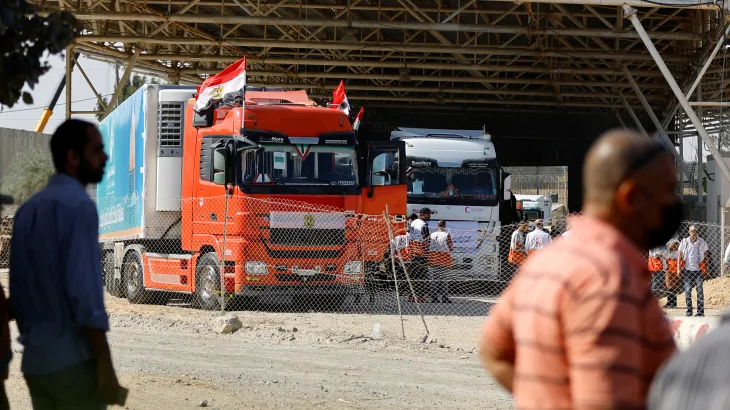“The Egypt-Gaza Rafah crossing has opened, allowing vital aid to reach the Gaza Strip amidst an ongoing Israeli siege. Learn about the relief convoy’s mission and the urgent humanitarian needs it aims to address.”
On Saturday, a convoy consisting of 20 aid trucks made its way into the Gaza Strip from Egypt, carrying a lifeline of medicine and food supplies. The announcement of this humanitarian effort came from the Palestinian group Hamas, which has been at the forefront of efforts to alleviate the suffering of the people in Gaza.

Egypt-Gaza Rafah Crossing
The situation in Gaza had been dire, with residents grappling with shortages of food, medicine, and even access to clean water due to the Israeli blockade. Desperation had mounted as the blockade continued, and the opening of the Rafah crossing was seen as a ray of hope.
In the days leading up to the crossing’s opening, over 200 trucks carrying roughly 3,000 tons of aid had been strategically positioned near the crossing, ready to deliver essential supplies to Gaza. The relief aid convoy that finally entered Gaza included 20 trucks laden with medicine, medical supplies, and a limited amount of canned goods.
The United Nations played a crucial role in facilitating this aid delivery. Martin Griffiths, the UN’s emergency relief coordinator, welcomed the operation and acknowledged the extensive negotiations that took place to ensure the aid reached Gaza under the right conditions. Griffiths stated, “I am confident that this delivery will be the start of a sustainable effort to provide essential supplies—including food, water, medicine, and fuel – to the people of Gaza, in a safe, dependable, unconditional, and unimpeded manner.”
However, one pressing concern remains: the absence of fuel in the aid shipments. Israel has repeatedly stated that the aid entering Gaza from Egypt would not include fuel. This has raised alarm bells, as fuel is essential for pumping water and powering generators, which are critical for operating facilities like hospitals.
The lack of fuel has already led to the shutdown of Gaza’s last functioning seawater desalination plant, leaving residents with even fewer options for obtaining clean water. Several hospitals have been forced to close their doors or operate on very low fuel supplies, impacting essential healthcare services and endangering the lives of patients, including those in critical conditions such as kidney and cancer patients.
Juliette Touma, communications director at the United Nations Relief and Works Agency for Palestine Refugees (UNRWA), emphasized the urgency of addressing the fuel shortage, stating, “Fuel is absolutely critical. Fuel needs to come in. If we are expected, and we would like to continue to deliver assistance to people, we will need fuel.”
The situation in Gaza has been exacerbated by recent events. In response to an October 7 rampage by Hamas fighters in southern Israel, Israel imposed a two-week blockade on the territory, which was accompanied by punishing air attacks. While the opening of the Rafah crossing is a significant step that may lead to more aid reaching Gaza, experts warn that much more is needed to alleviate the dire circumstances.
Al Jazeera’s James Bays noted that the 20 trucks of aid represent only a fraction of what Gaza used to receive on a daily basis before the conflict began. The current amount is indeed a “drop in the ocean” compared to the massive humanitarian need in the region.
The people of Gaza have been struggling to meet their basic needs, with many reduced to just one meal a day and facing severe water shortages. Hospital workers are in desperate need of medical supplies and fuel to keep their generators running as they treat thousands of people wounded in the bombings.
Cindy McCain, the executive director of the World Food Programme, emphasized the urgency of the situation, stating that 20 trucks of aid are far from sufficient. She highlighted the catastrophic conditions inside Gaza, where food, water, electricity, and fuel have become increasingly scarce, raising the risk of starvation and disease. McCain stressed the need to get more aid trucks into Gaza to avert a humanitarian catastrophe.
The Israeli blockade has effectively cut off the territory, forcing Palestinians to ration food and resort to drinking unclean water from wells. Hospitals are grappling with dwindling supplies of medicine and fuel for emergency generators, and the entire region is shrouded in darkness due to a widespread blackout.
Hamas, in its statement, expressed gratitude for the expected aid shipments but also acknowledged that this aid alone would not be sufficient to address the catastrophic medical conditions in Gaza. The situation in Gaza remains a stark reminder of the urgent need for a comprehensive and sustainable solution to end the suffering of its people.
also read Hamas Released 2 Hostages